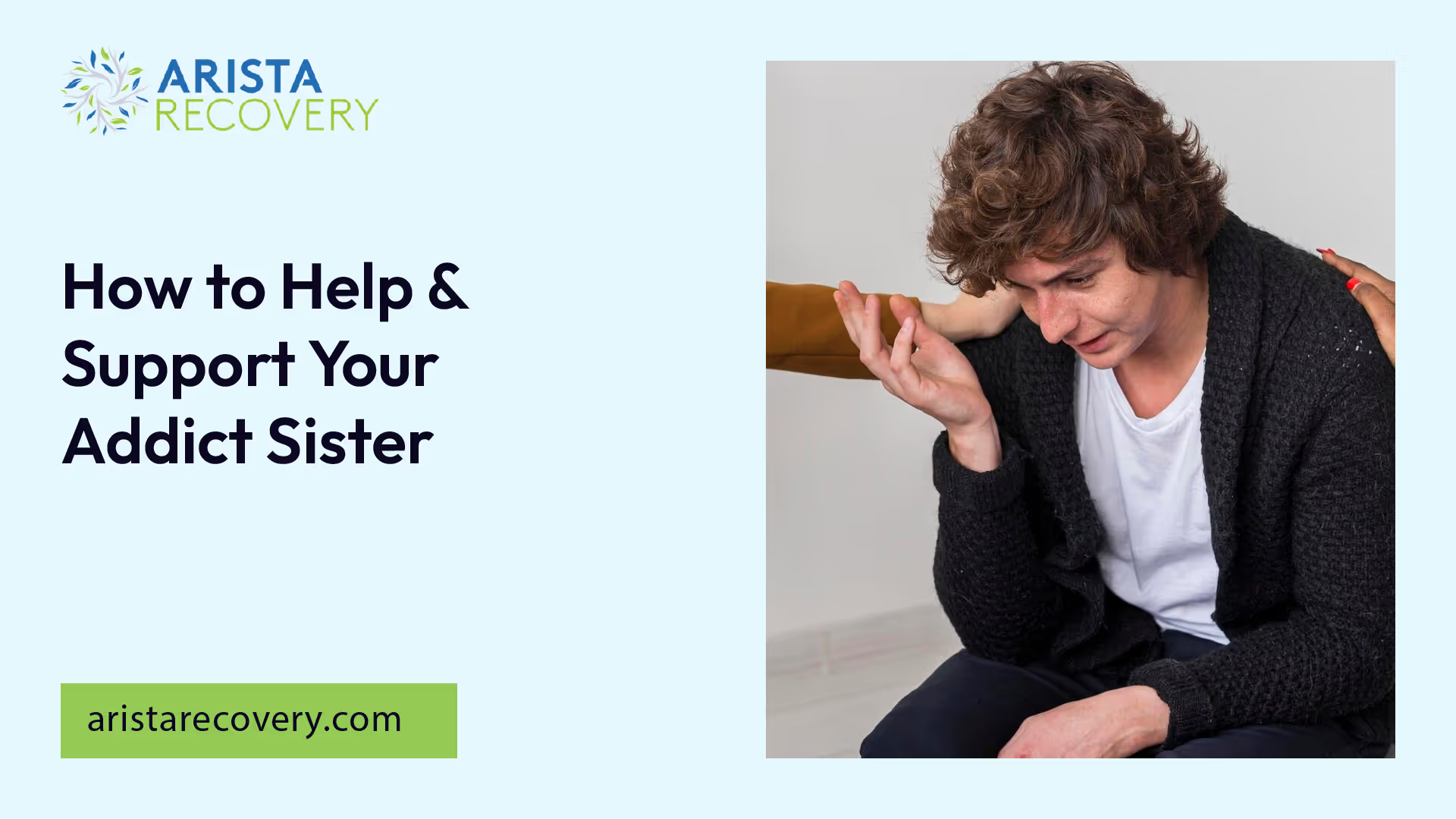How to Help & Support Your Addict Sister


Supporting a Loved One with Addiction
Understanding Addiction
Addiction is a complex condition that affects individuals and their families. According to the Centers for Disease Control and Prevention, one in 14 Americans reports experiencing a substance use disorder. People may resort to drugs or alcohol as a way to cope with stress, trauma, or mental health issues. Furthermore, addiction can develop after misusing medications prescribed by a physician [1].
Addiction impacts not only the individual but also their family members. Often, siblings, children, and parents may face abuse, violence, and emotional upheaval due to a loved one’s substance issues. While it's crucial to understand that one cannot control another's addiction, it is vital to prioritize safety and remove oneself from dangerous situations when necessary [2].
Understanding addiction is the first step in learning how to provide effective support. Knowledge of the symptoms of alcoholism or other substance use disorders can aid family members in recognizing the importance of responding with compassion and care. For more information on the signs, visit our article on signs of alcoholism you cant avoid.
Support Resources
When helping a loved one with addiction, exploring available support resources is essential. The support of peers and social networks can significantly influence recovery, helping individuals stay engaged in treatment. Asking the loved one how to provide support can foster a collaborative approach to recovery [3].
Various resources include:
Type of SupportDescriptionSupport GroupsMeetings where individuals share experiences and coping strategies. Groups like Alcoholics Anonymous target different substance use issues.Therapy ProgramsProfessional counselors and therapists provide individual or group therapy to address the underlying issues contributing to addiction.Educational ResourcesAccessing literature and online materials can further educate family members on addiction causes, symptoms, and effective interventions.
Engaging in family counseling can also be beneficial. This type of counseling focuses on how family dynamics affect substance use behaviors and how changes in family interactions can lead to positive outcomes [4]. It creates an environment where all members can express their feelings and learn to support each other effectively.
Through a combination of understanding addiction and utilizing available support resources, families can strengthen their role in recovery and foster an environment of healing. For more on the effects of addiction on families, explore our article on effects of alcohol ruining my family.
Family's Role in Recovery
Supporting a loved one through addiction is a challenging but essential part of the recovery journey. Family members play a significant role in this process, particularly through participation in support programs and continuous education.
Family Support Programs
Family support programs are crucial for fostering a productive environment for recovery. Research indicates that family support significantly enhances the effectiveness of treatment for mental and substance use disorders. Participating in support groups or family therapy can improve the overall treatment experience by addressing the needs of the entire family [5].
Here are some common family support programs:
Type of ProgramDescriptionSupport GroupsPeer-led gatherings that allow families to share experiences and coping strategies.Family TherapyProfessional therapy that focuses on improving communication and resolving conflicts within the family.Educational WorkshopsSessions that inform family members about addiction and recovery processes.
Engaging in these programs can help reduce stress and provide family members with the necessary tools to support their loved one effectively.
Education and Training
Understanding the nature of addiction is vital for family members. Education and training empower them to engage actively in their loved one's recovery. Key topics often include the nature of substance use disorders, risk factors, treatment options, self-care strategies, and identifying stigma [6].
Training opportunities for family members may cover:
Training TopicFocus AreaNature of Substance Use DisordersUnderstanding how addiction develops and affects behavior.Risk FactorsIdentifying personal and environmental triggers.Treatment OptionsExploring available therapies and support systems.Self-CareLearning to prioritize personal health and well-being.Stigma IdentificationRecognizing and addressing stigma related to addiction.
By participating in educational programs, family members can enhance their ability to support their loved one. Families are encouraged to seek resources that promote mutual understanding and foster a supportive environment, as they are fundamental in encouraging recovery and reducing the likelihood of relapse.
Establishing Boundaries
Setting boundaries is crucial when supporting a loved one struggling with addiction. By establishing clear limits on acceptable behavior, family members can protect themselves from the negative effects of substance use and create an environment that supports recovery.
Setting Healthy Limits
Healthy boundaries help define personal space and clarify what behaviors are unacceptable. They protect family members from substance-induced harms and contribute significantly to the recovery process. When family members enable substance use or engage in conflict, it can increase the likelihood of relapse among those in recovery [Recovery Answers].
Here are some examples of healthy limits that can be set:
Boundary TypeExampleEmotionalRefusing to engage in conversations that are abusive or toxic.FinancialSaying no to lending money that enables substance misuse.PhysicalSetting limitations on having substance use in the home.SocialChoosing not to attend gatherings where substance use is prevalent.
Establishing these boundaries will not only protect family members from harm but can also encourage the individual to take responsibility for their actions.
Impact on Recovery
Boundaries also play an essential role in the recovery journey. By engaging family members in treatment, families can positively affect both the individual struggling with addiction and themselves [Recovery Answers]. Positive family dynamics can contribute to a supportive atmosphere, promote accountability, and foster motivation for recovery.
It is equally important to recognize that established boundaries should not be rigid. Instead, they should evolve with the individual’s progress in recovery. Regular communication about boundaries can help create a shared understanding and adaptability as situations change.
Moreover, families should educate themselves about addiction and its impact. Gaining knowledge assists in empathizing with the struggles faced by their loved ones, making them better advocates in their recovery process [Footprints to Recovery].
By setting and maintaining healthy limits, family members can contribute to a more conducive environment for recovery, helping their loved one move towards healing rather than relapse. For those looking to help their addicted sister, understanding how to navigate these boundaries is a pivotal step in providing support and encouragement.
Seeking Professional Help
To provide the best support for a loved one struggling with addiction, it may be necessary to seek professional assistance. This includes understanding intervention strategies and exploring various treatment options available.
Intervention Strategies
Interventions can play a significant role in motivating individuals to seek help for their substance use issues. An intervention is a structured approach where family and friends come together to confront the individual about their behavior and encourage them to seek help. It is crucial to conduct these interventions thoughtfully and involve professionals when necessary.
Key points about intervention strategies include:
For further details on when to hold an intervention and how to execute it successfully, refer to the Mayo Clinic's resources on interventions.
Treatment Options
Once an individual is willing to seek help, various treatment options can be explored to support their recovery journey. These options often involve a combination of therapy, counseling, and support groups.
Choosing the right treatment option can lead to positive outcomes not only for the individual but also for the entire family. Seeking professional guidance when considering these options is advisable to ensure effective support throughout the recovery process. For more information on common signs of addiction, refer to our article on signs of alcoholism you can't avoid.
Open Communication
Effective communication is essential when dealing with a loved one's addiction. By discussing the issue openly and taking action together, families can create a supportive environment that encourages recovery.
Discussing Addiction
When engaging in conversations about addiction, it is crucial to be clear and upfront. Family members should express their concerns sincerely, explaining how the addiction affects them and their fears for the loved one's safety. This type of communication, grounded in care for the individual, allows for an honest dialogue about the addiction. It is also vital to give the loved one space and time to process this information. Setting and enforcing boundaries is necessary to protect one’s own well-being while supporting another, which may involve saying "no" when appropriate and explaining the reasons behind such limits [7].
Moreover, acknowledging the emotional turmoil surrounding the addiction can prevent misunderstandings that may arise during discussions. Strong emotions are a natural part of the situation, and it's essential to approach these conversations with sensitivity.
Taking Action Together
Taking action alongside an addicted loved one is a proactive approach. When family members engage in actions that promote recovery, it not only demonstrates commitment but also can strengthen the relationship. This collaborative approach may include seeking treatment options, attending support groups, or participating in family counseling sessions.
It's also important to educationally engage oneself in understanding addiction. This knowledge enhances empathetic communication and helps in advocating for your loved one [7]. By actively learning about addiction and recovery, family members can stay informed about the challenges their loved one faces, making them better equipped to provide support and encouragement.
Engaging with addiction professionals, such as licensed counselors, psychologists, or interventionists, can be beneficial. These professionals can provide tailored guidance on how to support the loved one effectively and may help organize interventions if necessary.
The combined efforts of open dialogue and collaborative action create a solid foundation for recovery and demonstrate care and understanding in the journey of healing.
Family Counseling in Addiction Treatment
Family counseling plays a crucial role in supporting individuals dealing with substance use disorders (SUD). By addressing the family dynamics influencing addiction, this approach facilitates recovery not only for the addict but for the entire family.
Therapeutic Approaches
Several therapeutic approaches are utilized in family counseling to enhance the recovery process:
Therapeutic ApproachKey FocusBehavioral Couples and Family CounselingImprove relationship quality and communicationFunctional Family Therapy (FFT)Modify dysfunctional interactions, address adolescent risk behaviorsSolution-Focused Brief TherapyFind solutions by emphasizing past successes
Effectiveness and Benefits
The effectiveness of family counseling in addiction treatment is evident through improved family dynamics and recovery outcomes. Key benefits include:
Family counseling profoundly impacts both individuals struggling with addiction and their families, aiding in the journey of recovery. For more information on recognizing addiction symptoms, visit our section on symptoms of alcoholism or learn about effects of alcohol ruining my family.
References
[2]:
[3]:
[4]:
[5]:
[6]:
[7]:
You’re not alone in this.
When mental health challenges and addiction intersect, it can feel isolating. At Arista, we offer compassionate, evidence-based, and trauma-informed care to help you heal, grow, and move forward.
You’re not alone in this.
When mental health challenges and addiction intersect, it can feel isolating. At Arista, we offer compassionate, evidence-based, and trauma-informed care to help you heal, grow, and move forward.
Support that moves with you.
You’ve taken a brave first step. At Arista Recovery, we’re here to help you continue with best-in-class care designed for long-term healing and support.
.webp)






